
Nov. 30, 2023
Organization of scientific events
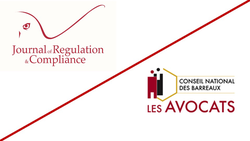
► Référence complète : M. Boissavy, H. Dehghani-Azar et M.-A. Frison-Roche (dir.), Journal of Regulation & Compliance (JoRC) et Conseil national des barreaux (CNB), Compliance, Vigilance et Médiation, Auditorium de la Maison du Barreau, 30 novembre 2023
____
► Présentation générale du colloque : Pour accroître le respect des droits humains et de l’environnement dans le cadre de la responsabilité sociale des entreprises et de la compliance, les pouvoirs publics et les entreprises mettent en œuvre depuis plusieurs années des instruments et processus de dialogue entre l’entreprise d’une part et les parties prenantes internes et externes à l’entreprise d’autre part. Parmi eux la médiation est régulièrement mise en avant comme étant un processus nécessaire et fécond pour trouver des accords bénéfiques tant pour les salariés et les acteurs de la société civile que pour l’environnement et la société globale.
John Ruggie, Représentant spécial du Secrétaire général chargé de la question des droits de l’Homme et des sociétés transnationales et autres entreprises, dans son rapport du 21 mars 2011, Principes directeurs relatifs aux entreprises et aux droits de l'homme, recommande la médiation comme mécanisme de réclamation non judiciaire efficace et approprié. La norme ISO 26000 sur la responsabilité sociétale vise aussi explicitement le recours à la médiation au point « Actions et attentes associées » (6.3.2.6) en ces termes : « il convient qu’une organisation établisse des mécanismes de recours pour son propre usage et pour celui des parties prenantes, ou qu’elle en assure la disponibilité. Pour que ces mécanismes soient efficaces, il convient qu’ils soient […] fondés sur le dialogue et la médiation : il convient que le processus vise à remédier aux atteintes à l’aide de solutions mutuellement acceptées, obtenues par un dialogue entre les parties. Lorsqu’un jugement est souhaitable, il convient que les parties conservent le droit d’y parvenir au moyen de mécanismes distincts, indépendants ».
De la même façon, la loi n°2017-399 du 21 mars 2017 relative au devoir de vigilance des sociétés mères et des entreprises donneuses d’ordre suscite des contentieux relatifs à la conception et à l’application de plans de vigilances de certaines entreprises assujetties. Le recours à la médiation a été proposé par le juge, parfois accepté et l’on sait que certaines ont réussi.
Parallèlement, le projet de directive européenne sur le devoir de vigilance des entreprises en matière de durabilité (dite CS3D pour Corporate Sustainability Due Diligence Directive) est de nature, à faire peser ou à étendre pour un grand nombre d’entreprises de l’Union Européenne des obligations au titre du devoir de vigilance pour le respect des droits de l’homme et l’environnement par les entreprises dans les chaînes de valeur mondiales.
Il résulte de tout cela que lee respect des droits de l’Homme au sein des organisations et entreprises repose le recours aux juridictions, sur des processus de coopération comme peut l’être la médiation, tant celle de projet que celle spécifique à la résolution des différends, dans le même temps que le recours juridictionnel ne suffira pas à rendre rapidement efficace le respect de ces obligations.
Le législateur et les parties concernées en sont conscientes et elles évoquent le recours à la médiation comme nécessaire pour aider tant les acteurs de la société civile engagés pour le respect des droits humains et de l’environnement que les entreprises à trouver des accords pour le respect de ces obligations.
Les avocats, médiateurs, personnes assistant les parties prenantes et les entreprises, ont un rôle important à jouer pour le succès de ces médiations.
Le Conseil national des barreaux organise, en collaboration avec le Journal of Regulation and Compliance (JoRC), un colloque d’une demi-journée « Compliance, vigilance et médiation » pour former les avocats à cette activité qui va se développer soit en prolongement d’une activité soit en activité propre et qui a des implications importantes tant pour les droits de chacun, la société que pour l’environnement.
____
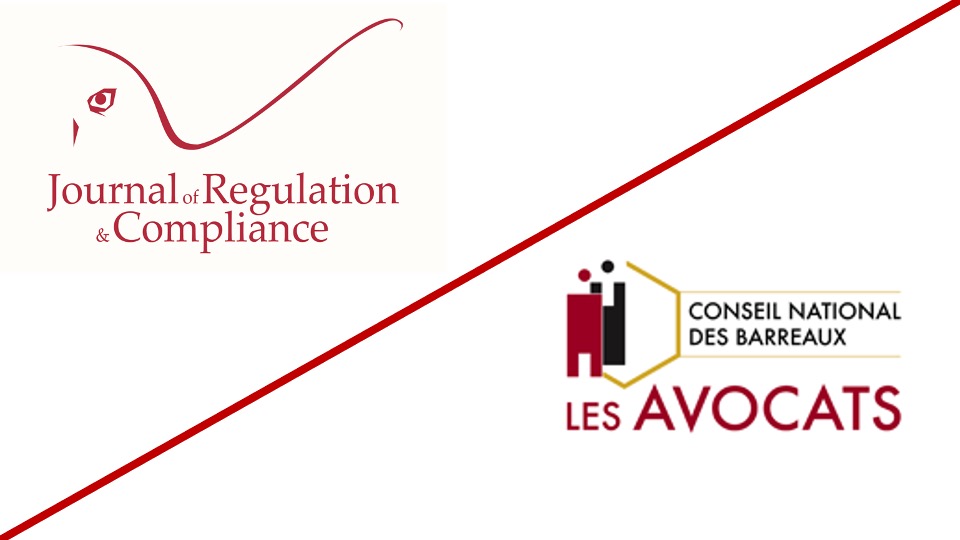
____
► Interviennent :
🎤Matthieu Boissavy, avocat au Barreau de Paris, vice-président de la Commission Liberté et droits de l'homme du CNB
🎤Matthieu Brochier, avocat au Barreau de Paris
🎤Stéphanie Brunengo, avocate au Barreau d'Aix-en-Provence, médiatrice
🎤Malik Chapuis, juge à la 3ième chambre civile du Tribunal judiciaire de Paris
🎤Lucie Chatelain, responsable contentieux et plaidoyer SHERPA
🎤Bruno Deffains, professeur à l'Université Paris Panthéon-Assas
🎤Hirbod Dehghani-Azar, avocat au Barreau de Paris, président de la Commission Modes alternatifs de règlements des Règlements (MARD) du CNB
🎤Marie-Anne Frison-Roche, professeure de Droit de la Régulation et de la Compliance, directrice du Journal of Regulation & Compliance (JoRC)
🎤Jérôme Gavaudan, président du CNB
🎤Thibault Goujon-Bethan, professeur à l'Université Jean Moulin Lyon 3
🎤Céline Haye Kioussis, directrice juridique du Groupe BPCE
🎤Laurence Joly, avocate au Barreau de Thonon-les-Bains
🎤Stéphane de Navacelle, avocat au Barreau de Paris
🎤Lori Roussey, Data Protection Officer, fondatrice et Directrice de Data Rights
🎤Stephanie Smatt Pinelli, directrice juridique Contentieux, groupe Orano
____
Lire une présentation détaillée de la manifestation ci-dessous⤵️
Nov. 30, 2023
Conferences
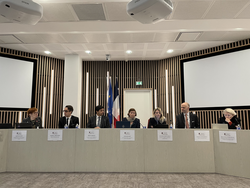
🌐follow Marie-Anne Frison-Roche on LinkedIn
🌐subscribe to the Newsletter MAFR Regulation, Compliance, Law
____
► Full Reference: M.-A. Frison-Roche, "Conclusion", in M. Boissavy, H. Dehghani-Azar, and M.-A. Frison-Roche (dir.), Journal of Regulation & Compliance (JoRC) and Conseil national des Barreaux (CNB), Compliance, vigilance et médiation (Compliance, Vigilance and Mediation), Amphitheatre of the Conseil national des Barreaux, November 30, 2023.
____
🧮see the full programme of this event
________
Nov. 17, 2023
Publications
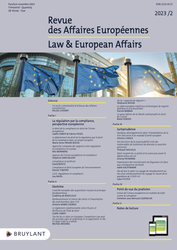
🌐follow Marie-Anne Frison-Roche on LinkedIn
🌐subscribe to the Newsletter MAFR Regulation, Compliance, Law
____
► Full Reference: M.-A. Frison-Roche, "The deployment of Regulatory Law through Compliance Law in the European project", in G. Hardy & F. Picod, Compliance Regulation from a European Perspective, Law and European Affairs (L.E.A.), 2023/2, pp. 345-352.
____
🚧read the bilingual Working Paper which is the basis of this article, with additional developments, technical references and hyperlinks
____
► English Summary of the article: Compliance Law is neither a method of obeying regulations, nor a simple neutral method of ensuring the effectiveness of norms, nor a means of enforcement displaced from Ex Post to Ex Ante. It is an extension of Regulatory Law and goes beyond it. Like it, it aims to build spaces according to a political project specific to an area, such as Europe. Branch of Law looking to the future as Regulatory Law does, it constructs and maintains, in a systemic way, sustainable, albeit unstable, balances to achieve the ‘Monumental Goals’ in which its normativity resides: security, sustainability, probity, truth, and dignity. By internalising these Monumental Goals in the companies that are in a position to achieve them, the “crucial companies”, Compliance Law preserves the logic of Regulatory Law, offering it a prodigious expansion since it frees it from the condi- tion of a sector and territorial borders, which seemed tautological, by associating private powers and public will, which remains primary. In this way, Compliance can regulate the digital space and climate issue through political choices made by a sovereign Europe.
________

Nov. 15, 2023
Publications

🌐suivre Marie-Anne Frison-Roche sur LinkedIn
🌐s'abonner à la Newsletter MAFR Regulation, Compliance, Law
🌐s'abonner à la Newsletter en vidéo MAFR Surplomb
____
 ► Référence complète : M.-A. Frison-Roche, La Vigilance, pointe avancée et part totale de l'Obligation de Compliance, novembre 2023.
► Référence complète : M.-A. Frison-Roche, La Vigilance, pointe avancée et part totale de l'Obligation de Compliance, novembre 2023.
____
🎤 Ce document de travail a été initialement élaboré pour servir de base à l'intervention, Articulation systémique entre Vigilance, Due diligence, conformité et Compliance, dans la première journée du colloque que j'ai coorganisé : 🧮La vigilance, pointe avancée de l'Obligation de Compliance, le 5 décembre 2023.
____
Il a été par la suite repris pour constituer la base d'un article à paraître:
📝La Vigilance, pointe avancée et part totale de l'Obligation de Compliance
in📕L'obligation de compliance, dans la collection 📚Régulations & Compliance
📝Vigilance, the cutting edge and a full part of the Compliance Obligation
in📘Compliance Obligation, dans la collection 📚Compliance & Regulation
____
► Résumé du document de travail : La
____
🔓lire les développements ci-dessous⤵️
Nov. 9, 2023
Publications
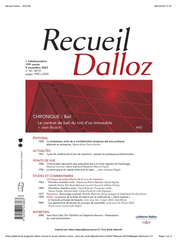
🌐follow Marie-Anne Frison-Roche on LinkedIn
🌐subscribe to the Newsletter MAFR Regulation, Compliance, Law
____
► Full Reference: M.-A. Frison-Roche, "La compliance, socle de la confidentialité nécessaire des avis juridiques élaborés en entreprise" ("Compliance, the cornerstone of the confidentiality required for in-house legal opinions"), D. 2023, p.
____
📝read the article (in French)
____
► English Summary of the article: The French Law about the Ministry of Justice's 2023-2027 Orientation and Programming ("loi d'orientation et de programmation du ministère de la justice 2023-2027") had introduced into the French legal system the confidentiality of in-house lawyers' opinions (before the French Constitutional Council, on a question of parliamentary procedure, annulled this disposition, thus leaving the question still open).
This development is necessary in order to respond to the injunction for companies to comply more and more with the regulations, which is itself only one of the tools of a wider movement: Compliance Law.
This branch of the law, notably through the French so-called Sapin 2 Act of 2016, the French Vigilance Act of 2017 and the European Digital Services Act (DSA), requires companies to implement the necessary means to satisfy the Monumental Goals contained in the laws or regulations. This presupposes, firstly, that companies have information (via alerts, risk mapping, vigilance, sustainability reports, etc.), enabling them to identify their conformity and non-conformity, so that they can, secondly, take effective action to put an end to current breaches, prevent future breaches and achieve the goals set by the Legislator.
This Compliance System requires that the information made available to managers is reliable and honest. However, if non-conformity is not analysed and communicated in a way that is protected by confidentiality, the company will prefer not to know about it and will therefore be unable to take appropriate action, which will deprive the social community of its power to act in the future. This is why the confidentiality of in-house lawyers' opinions is based on the very definition of Compliance Law itself.
________
Nov. 9, 2023
Publications

🌐follow Marie-Anne Frison-Roche on LinkedIn
🌐subscribe to the Newsletter MAFR Regulation, Compliance, Law
____
► Full Reference: M.-A. Frison-Roche, "Reinforce the Judge and the Lawyer to impose Compliance Law as a characteristic of the Rule of Law", in M.-A. Frison-Roche (ed.), Compliance Jurisdictionalisation, Journal of Regulation & Compliance (JoRC) and Bruylant, "Compliance & Regulation" Serie, 2024, pp. 39-65
____
📝read the article
____
🚧read the bilingual Working Paper which is the basis of this article, with additional developments, technical references and hyperlinks
____
📘read a general presentation of the book, Compliance Jurisdictionalisation, in which this article is published
____
► This article is the introduction of the book.
► Summary of the article (done by the Journal of Regulation & Compliance): One can understand that the compliance mechanisms are presented with hostility because they seem designed to keep the judge away, whereas there is no Rule of Law without a judge. Solid arguments present compliance techniques as converging towards the uselessness of the judge (I). Certainly, we come across magistrates, and of all kinds, and powerful ones, but that would be a sign of imperfection: its ex-ante logic has been deployed in all its effectiveness, the judge would no longer be required... And the lawyer would disappear so with him...
This perspective of a world without a judge, without a lawyer and ultimately without Law, where algorithms could organize through multiple processes in Ex Ante the obedience of everyone, the "conformity" of all our behaviors with all the regulatory mass that is applicable to us, supposes that this new branch of Law would be defined as the concentration of processes which gives full effectiveness to all the rules, regardless of their content. But supposing that this engineer's dream is even achievable, it is not possible in a democratic and free world to do without judges and lawyers.
Therefore, it is imperative to recognize their contributions to Compliance Law, related and invaluable contributions (II).
First of all, because a pure Ex Ante never existed and even in the time of the Chinese legists📎!footnote-2689, people were still needed to interpret the regulations because a legal order must always be interpreted Ex Post by who must in any case answer the questions posed by the subjects of law, as soon as the political system admits to attributing to them the right to make claims before the Judge. Secondly the Attorney, whose office, although articulated with the Judge's office, is distinct from the latter, both more restricted and broader since he must appear in all cases where the judicial figure puts himself in square, outside the courts. However, Compliance Law has multiplied this since not only, extending Regulatory Law, it entrusts numerous powers to the administrative authorities, but it also transforms companies into judges, in respect of which the attorneys must deal with.
Even more so, Compliance Law only takes its sense from its Monumental Goals📎!footnote-2690. It is in this that this branch of the Law preserves the freedom of human beings, in the digital space where the techniques of compliance protect them from the power of companies by the way that the Compliance Law forces these companies to use their power to protect people. However, firstly, it is the Judges who, in their diversity📎!footnote-2691, impose as a reference the protection of human beings, either as a limit to the power of compliance tools📎!footnote-2692 or as their very purpose. Secondly, the Attorney, again distinguishing himself from the Judge, if necessary, reminds us that all the parties whose interests are involved must be taken into consideration. In an ever more flexible, soft and dialogical Law, everyone presenting himself as the "advocate" of such and such a monumental goal: the Attorney is legitimate to be the first to occupy this place.
________
Nov. 8, 2023
Thesaurus : Doctrine

► Full Reference: Peicuti, C. et Beyssade, J., Feminisation of positions of responsibility in the workplace as a goal of Compliance, in Frison-Roche, M.-A. (ed.), Compliance Monumental Goals, series "Compliance & Regulation", Journal of Regulation & Compliance (JoRC) and Bruylant, 2023,pp.117-135.
____
► Article Summary: If the Compliance techniques are conceived as taking their meaning by their Goal, the latter being in particular the protection and the effective promotion of human beings, to be reinforced in the future thanks to Compliance Law tools, the example of the effective promotion of efficient equality between women and men in the banking sector to exercise responsible functions is clear.
strongly feminized, the image of banking sector remains masculine and in fact too few women exercise positions of responsibility, although no text is opposed to it and all rights have been allocated for this. To move from this situation to a future where equality will be effective, it is therefore in terms of regulatory mechanisms that we should think of the necessary transformation and even more of "transition" so that one day a de facto equality will be established. and appears natural to all.
The bank must then structurally integrate this Goal, which corresponds to the definition of Compliance. To do this, the banking company is part of a long-term voluntary Compliance process, relying in particular on human resources and on the public authorities of the European Banking Union which, by further implementing the concept of sustainable economy, facilitated this long-term action. In this transition, each action and result must be considered in relation to this sought-after goal of effective equality: each progress must be valued not so much in relation to the past but in relation to the future. This Ex Ante perspective justifies these self-binding Compliance techniques, such as plans, commitments, quotas, stakeholder implications, and more flexible techniques such as examples given by managers, internal training and joint affirmations with the public authorities, are all used by the company to achieve this Monumental Goal of effective equality between human beings.
The banking sector is all the more exemplary for this because the banking authorities themselves deploy incentives in this direction, the definition of Compliance Law as an alliance between the Authorities and the Companies therefore corresponding to such an action clearly in progress, structurally in the BPCE group.
____
📝 see the general presentation of the book 📘Compliance Monumental Goals in which this article is published
________
Nov. 6, 2023
Newsletter MAFR - Law, Compliance, Regulation

🌐suivre Marie-Anne Frison-Roche sur LinkedIn
🌐s'abonner à la Newsletter MAFR Regulation, Compliance, Law
____
► Référence complète : M.-A. Frison-Roche, "Compliance, Vigilance et Médiation (🧮30 novembre 2023)", Newsletter MAFR Law, Compliance, Regulation, 6 novembre 2023
____
📧Lire par abonnement gratuit d'autres news de la Newsletter MAFR - Law, Compliance, Regulation
____
🧱La médiation, un outil efficace et déjà éprouvé en matière de Vigilance
Le devoir de vigilance est la pointe avancée du droit de la compliance. La médiation commence déjà à montrer son efficacité pour la mise en oeuvre délicate voir controversée de la technique nouvelle de Vigilance.
____
📧voilà le programme détaillé du colloque que le Journal of Regulation & Compliance (JoRC) et le Conseil national des barreaux (CNB) organisent le 30 novembre 2023 sur le sujet, incluant les modalités d'inscription ⤵️
Oct. 6, 2023
Conferences

♾️follow Marie-Anne Frison-Roche on LinkedIn
♾️subscribe to the Newsletter MAFR Regulation, Compliance, Law
____
► Full Reference: M.-A. Frison-Roche, "La rencontre des MARD/PRD avec les Buts Monumentaux de la Compliance" ("The meeting of the alternative dispute resolution mechanisms with Compliance Monumental Goals"), in A. Albarian, S. Brunengo, D. Labrèche et N. Vermeys (dir.), Regards croisés France/Québec: l'essor et l'adaptation des PRD/MARD dans un contexte de crise, Aix-Marseille University, 6 and 7 October 2023.
____
🧮see the full programme of this event
________
Oct. 4, 2023
Conferences

🌐follow Marie-Anne Frison-Roche on LinkedIn
🌐subscribe to the Newsletter MAFR Regulation, Compliance, Law
____
 ► Full Reference: M.-A. Frison-Roche, "L'avenir du Droit de la compliance" (The futur of Compliance Law), in Cour de cassation (French Court of cassation), La Nuit du Droit 2023, October 4, 2023.
► Full Reference: M.-A. Frison-Roche, "L'avenir du Droit de la compliance" (The futur of Compliance Law), in Cour de cassation (French Court of cassation), La Nuit du Droit 2023, October 4, 2023.
____
🎥 Watch the video (in French)
____
🧮read the full programme of this event
The Cour de cassation (French Court of cassation) had presented 4 successive themes insofar as they affect the future of Law: filiation, artificial intelligence, the environment and compliance.
The President of the Chambre sociale de la Cour de cassation (Social Chamber of the Court of Cassation) gave a presentation on Compliance and the essential role played by the Judge. Then, the Parquet général (Prosecutor General's Office) then asked Fabien Raynaud, Conseiller d'État, about the importance of 'systemic cases' in Compliance Law and the dialogue between judges that it implies, using the Youporn case currently being examined by the judges.
____
► General presentation of the speech: As my work has been seminal for Compliance Law, I was asked about the future of Compliance Law.
________
Oct. 2, 2023
Conferences

♾️follow Marie-Anne Frison-Roche on LinkedIn
♾️subscribe to the Newsletter MAFR Regulation, Compliance, Law
____
► Full Reference: M.-A. Frison-Roche, Participation à la Table ronde "Normes de Responsabilité Sociale des Entreprises (RSE & Devoir de Vigilance)" (Participation in the Round Table "Corporate Social Responsibility Standards (CSR & Duty of Vigilance)"), in Fribourg University, Journée du Droit, Fribourg University, Pérolles site, room C230, October 2, 2023.
____
🧮see the full programme of this event
🎥watch the video of this event (in French)
____
🌐read the report written in French with photos, tags and links on LinkedIn and also with links to each the speech
____
► General presentation of the event : This conference, build around 4 presentations and a debate between the speakers and then with the audience, aimed at explaining and understanding this fundamental movement and the new texts that express it in Switzerland, even if it is French law, such as the so-called 'Vigilance' law of 2017 and the draft European CS3D directive, because on the one hand it is a movement that begins with legal technique and on the other hand the texts in question are extraterritorial in scope, if only because of the notion of 'value chain'. In the first part of this round table, and to set the scene, I will outline the origin and content of the French 'Vigilance' law, the way in which the draft directive draws heavily on it, its relationship with Compliance Law, of which it constitutes the 'advanced point', and the decisive role it gives to the courts, in the general movement of the jurisdictionalisation of compliance. The purpose of this is to allow the discussion to get underway.
🕴️Idris Abdelkhalek, PhD candidate and lawyer, introduced the speakers and led the debate between them and the audience. He took questions from the audience on the intensity of the obligation weighing on companies, in particular between civil liability and criminal liability, between the obligation of means and the obligation of result, and on the way in which the duty of vigilance is applied to specific sectors such as defence.
____
► Presentation of my speech : the subject of which was Presentation of French Vigilance law, European perspective and European Compliance System. My presentation was divided into four points. Firstly, I outlined the state of Law in France, in the novelty represented by the 2017 law known as the "Vigilance" law, whose principles are simple and strong, principles that are situated in the aims pursued, and the way in which this law inspires what is currently being negotiated: the CS3D Directive.
Secondly, I stressed the need for companies to master these often technically complicated corpus, especially if we take into account the link between Vigilance and the CSRD directive on sustainability reporting and extra-financial information.
Thirdly, I have shown that an overall understanding can nevertheless be achieved, and that the technical nature of the 'tools' is better mastered if we place the duty of vigilance within Compliance Law, of which it constitutes the 'advanced point'. All of this anchors its legal normativity in the 'Monumental Goals' it serves, which in Europe are humanistic, since the aim is to protect, now but above all in the future because it is a branch of ex ante Law, the human beings involved in the systems (banking, finance, energy, digital, climate, etc.).
Fourthly, I emphasised that this understanding enables everyone to play their part: political and public authorities, businesses and stakeholders. Even more, and at the heart of the matter, the judge plays an essential role, even in countries with so-called 'continental' Law. I have used current cases as examples. This is just the beginning, and judges need to train, specialise and work in dialogue to achieve this.
____
► Presentation of the other speakers contributions :
🕴️Marion Paradas, Ambassador of France to Switzerland and Liechtenstein, opened the conference and gave a general presentation of the theme. Ambassador Marion Paradas presented the international challenge represented by Law, illustrated here by the duty of vigilance. She emphasised that this is a major issue, both now and in the future, for Swiss companies and French companies based in Switzerland, particularly as this duty extends throughout the "value chain" and in view of the CS3D directive, which will also have consequences for both.
🕴️Isabelle Chabloz Waidacher, Professor at the Faculty of Law in Fribourg and holder of the Chair of Economic Law at the University of Fribourg, gave a Presentation of Swiss Law. In particular, she emphasised the state of Swiss Law, which could have gone further than the 2017 French law known as the "Vigilance" law if the popular initiative reference had led to the adoption of a law, and which currently focuses more on information and transparency obligations, with CSR taking over from there. But she stresses that the reality of value chains will force Swiss companies to take into account the requirements of the European directive currently being adopted.
🕴️Renaud Roussel, Managing Director of Colas Switzerland, presented an entrepreneurial view of the subject. He began by outlining the concrete steps taken by his industrial group in Switzerland and around the world to implement its commitments to protect the environment, for example by ensuring the proper use of materials used in road construction. He also stressed the importance of human rights, particularly in labour relations, in the context of CSR and vigilance. He went on to point out that it was not always easy for a large company to meet its own requirements, or the requirements imposed on it by the law, because in the construction and public works sector in particular it is often small companies that are competing, competitors who do not bear the costs of such obligations.
________
Sept. 15, 2023
Publications
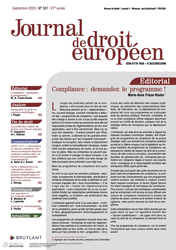
🌐follow Marie-Anne Frison-Roche on LinkedIn
🌐subscribe to the Newsletter MAFR Regulation, Compliance, Law
____
► Full Reference: M.-A. Frison-Roche, "Compliance : demandez le programme !" ("Compliance: ask for the programme!), J.D.E., 2023/7, No. 301, p. 349.
____
📝read the article (in French)
____
🌐see the LinkedIn post presenting this article
____
► Summary of the article: Compliance programmes are neither constraints imposed by a 'mad regulator' forcing companies to show in advance that they comply with all the regulations applicable to them, nor are they a delegation by the State of tasks it is incapable of accomplishing, such as eradicating corruption or stopping global warming.
On the contrary, they are a tool in the service of the alliance between public authorities and companies in the pursuit of the Monumental Goals of Compliance Law. Through them, the company implements actions to prevent the systemic risks associated with its activity. It thus assists the authorities in regulating new areas (digital, space) while adopting a sustainable strategy. As a result, it does not suffer from regulations, but participates in shaping the future. In this future, the judge plays a central role in shaping the compliance programmes that will be raised or challenged in 'systemic cases'.
________
Sept. 7, 2023
Publications

🌐follow Marie-Anne Frison-Roche on LinkedIn
🌐subscribe to the Newsletter MAFR Regulation, Compliance, Law
____
► Full Reference: M.-A. Frison-Roche, "Droit de la compliance et climat. Pour prévenir le risque et construire l'équilibre climatiques" ("Compliance Law and climate. Prevent the climate risk and build the climate balance"), in M. Torre Schaub, A. Stevignon and B. Lormeteau (ed.), Les risques climatiques à l'épreuve du droit, Mare & Martin, coll. "Collection de l'Institut des sciences juridique et philosophique de la Sorbonne", 2023, pp.73-83
____
📝read the article (in French)
____
🚧read the bilingual Working Paper which is the basis of this article, with additional developments, technical references and hyperlinks
____
► Summary of the article: Compliance Law is beginning to emerge in climate topic, through the expression "Climate Compliance Law", but the climate issue itself is the most perfect example of why General Compliance Law is made for. It is indeed a new branch of Law, a global Law claiming to provide Ex Ante solutions here and now for global issues, so that in the future systemic catastrophies will not occur, will not happen: it is these "Monumental Goals" that give meaning, coherence, and simplicity to Compliance Law.
Compliance Law, linked to the Rule of Law principle, makes it possible to go beyond the choice often presented between the effectiveness of the protection of the planet and the renunciation of freedoms, in particular the freedom to do business and the freedom of individuals, especially the protection of their data.
Climate is thus exemplary of the object of Monumental Goals of Compliance Law (I). The systemic risk that it now constitutes is analogous to Banking or Digital Systemic Risks and therefore calls for the application of identical legal Compliance Tools, formerly put in place for Banking Regulatory and Compliance Law, recently invented for Digital. Compliance Law, extending Regulation Law, itself from the precondition of the Sector and the Territory, is therefore the branch which makes it possible to put in place new legal solutions, either by force (judicial agreements, compliance programs, etc.), or by will (commitments, global charters, etc.).
Therefore, an alliance can exist between political and public authorities, and crucial economic operators (II), that the rise in power of the "raison d'être" is the sight and whose technical challenge is the collection of information that must be put in correlation. Scientists pooling Information, this public good, provided by public and private entities. The courts are at the center of this articulation between Compliance Law and Climate, which object is the Future.
________
Aug. 31, 2023
Conferences
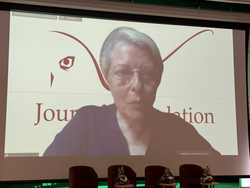
♾️suivre Marie-Anne Frison-Roche sur LinkedIn
♾️s'abonner à la Newsletter MAFR Regulation, Compliance, Law
____
► Référence complète : M.-A. Frison-Roche, "Le prolongement du Droit de la Régulation par le Droit de la Compliance : fixer les buts et superviser les moyens", in XXIV Jornadas Internacionales de Derecho Administrativo (XXIVièmes Journées internationales de Droit administratif), Université Externado de Colombie, Bogota, 31 août 2023.
____
🧮consulter le programme complet cette manifestation
Présentation de la conférence : Dans le temps imparti, il n'est pas discuté de la façon dont les États se transforment pour devenir des "États Régulateurs" : cela est exposé dans d'autres contributions. Il est donc ici pris pour acquis que les Etats sont "Régulateurs" à la fois dans leur conception même (c'est-à-dire qu'ils accompagnent l'économie de marché pour l'infléchir en s'appuyant sur elle) et dans des techniques nouvelles, notamment la mise en place des Autorités de Régulation. C'est ainsi que naît une branche spéciale du Droit : le Droit de la Régulation. Celui-ci demeure encore ancré dans le Droit administratif à beaucoup d'égard (cela non plus n'est pas discuté ici).
En quelque sorte, la présente contribution porte sur l'étape suivante, qui consiste au développement de cette sorte d'étape qu'est l'Etat Régulateur, qu'exprime le Droit de la Régulation, dans le Droit de la Compliance. Il convient de conserver ce terme américain de "compliance", malgré toutes ses ambiguïtés, parce que l'instant on n'en a pas trouvé d'autres ...
La conférence est bâtie en dix points, succinctement développés dans le document de travail sous-jacent.
____
🚧Lire le document de travail sous-jacent à la conférence.
________
Aug. 3, 2023
Publications
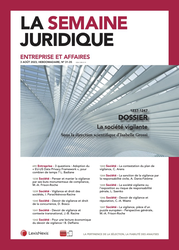
♾️follow Marie-Anne Frison-Roche on LinkedIn
♾️subscribe to the Newsletter MAFR Regulation, Compliance, Law
____
► Full Reference: M.-A. Frison-Roche, "La vigilance, pièce d'un puzzle européen" ("Vigilance, a piece of the European puzzle"), in I.Grossi (ed.), La société vigilante, JCP E, No. 31-35, 3 août 2023, pp.57-58.
____
📙this article is the conclusion of this special issue.
It is linked to the introductory article of this special issue: 📝Penser et manier la vigilance par ses buts monumentaux de compliance (Thinking and using Vigilance through its Compliance Monumental Goals)
____
🧮the 2 articles follow on from the introductory and concluding speeches in the colloquium La Société vigilante, held at the University of Aix Marseille on 24 March 2023
____
🚧read the bilingual Working Paper which is the basis of this article, with additional developments, technical references and hyperlinks
____
► Summary of the article: The contributions form a contrasted whole. It should not be concluded that some of them are correct and others false: through the reading that each one makes of the so-called French 2017 "Vigilance law," it is a vision of the world as it should be that each author proposes. Because Compliance Law, which Vigilance is a part, claims to draw the future, it is normal that each author should draw the present Law with a hand that bends in one direction or the other, following their conception of the future world. The whole contributions must be seen as a dialogue.
A lively dialogue, with this French 2017 law receiving a lot of "glory" and a lot of "indignity" on both sides, from which it is necessary to emerge in order to find solutions, because it is a fundamental movement of which this law is only a gateway (I). Whatever one thinks of it, it is all the branches of law that are used, affected, and transformed by Vigilance (II). To master this profound transformation, we must turn to Europe, to the great puzzle of texts recently adopted or in the process of being adopted in the European Union, of which Vigilance is the hallmark (III).
____
📝read the article (in French)
________
Aug. 3, 2023
Publications

♾️follow Marie-Anne Frison-Roche on LinkedIn
♾️subscribe to the Newsletter MAFR Regulation, Compliance, Law
____
► Full Reference: M.-A. Frison-Roche, "Penser et manier la vigilance par ses buts monumentaux de compliance" ("Thinking and using Vigilance through its Compliance Monumental Goals"), in I.Grossi (ed.), La société vigilante, JCP E, No. 31-35, 3 August 2023, pp.16-20.
____
📙this article is the introduction of this special issue.
It is linked to the concluding article of this special issue: 📝La vigilance, pièce d'un puzzle européen (Vigilance, a piece of the European puzzle)
____
🧮the 2 articles follow on from the introductory and concluding speeches in the colloquium La Société vigilante, held at the University of Aix Marseille on 24 March 2023
____
🚧read the bilingual Working Paper which is the basis of this article, with additional developments, technical references and hyperlinks
____
► Summary of the article: The concept of "Vigilance" is difficult to define. Probably because even as it is becoming a standard, it has just entered the legal systems. And what a splash it is! To understand it, it must not be isolated. Neither in the only French law attracting all the attention, all the fears, all the hopes, the so-called Loi Vigilance ("Vigilance Law"), nor in the only technical mechanisms that make Vigilance a reality.
Vigilance is itself only a part of a deeper movement, of which it is the advanced point, allowing us to anticipate the evolution of the whole: Compliance Law.
In this light and for not getting lost in it, because the stakes are so high that one quickly loses the measure of things, with each party lashing out at the others, so Vigilance, the key element of Compliance, requires above all alliances, that we can first examine the entry of Vigilance into the legal system and then understand it through the Monumental Goals which give the measure of it, i.e. both the scope and the limit, each one having to act within the margins that are theirs, States, companies, stakeholders, and judges.
A Will for tomorrow can then emerge today, carried by Europe.
____
📝read the article (in French)
________
July 28, 2023
Interviews

♾️follow Marie-Anne Frison-Roche on LinkedIn
♾️subscribe to the Newsletter MAFR Regulation, Compliance, Law
____
► Full Reference: M.-A. Frison-Roche & S. Vernet, "La profession investit le Droit de la compliance et détermine sa Raison d’être" ("The profession invests Compliance Law and determines its Raison d'être"), Actualités, Ordre des Géomètres-Experts, July 28, 2023
____
💬read the interview (in French)
____
► Presentation of the interview by the Ordre des Géomètres-Experts: "Pour mieux répondre aux défis d’une société en pleine mutation, ainsi qu’aux attentes de ses clients et concitoyens, la profession détermine sa Raison d’être. Séverine Vernet, première Vice-présidente de l’Ordre des géomètres-experts et Marie-Anne Frison-Roche, professeur de droit économique et spécialiste du droit de la régulation et de la compliance, nous expliquent cette démarche innovante." ("To better meet the challenges of a rapidly changing society and the expectations of its customers and fellow citizens, the profession is defining its raison d'être. Séverine Vernet, First Vice-President of the Ordre des géomètres-experts, and Marie-Anne Frison-Roche, Professor of Economic Law and specialist in Regulatory and Compliance Law, explain this innovative approach.").
____
► Questions asked (in French):
- Séverine Vernet, vous êtes la première Vice-présidente de l’OGE et présidente de la nouvelle commission compliance. Permettez-moi tout d’abord de vous féliciter pour votre réélection. Quels seront les prochains chantiers du mandat qui démarre ? Et votre ambition pour ce nouveau mandat ?
- Marie-Anne Frison-Roche (mafr), vous êtes professeur d’université, spécialiste de droit économique et plus particulièrement du droit de la régulation et de la compliance, vous accompagnez l’Ordre dans la mise en place de cette démarche. Séverine Vernet parle de compliance. Pourriez-vous nous en proposer une définition ?
- L’OGE a créé une commission compliance spécifique que vous présidez. Pouvez-vous nous en dire un peu plus ?
- Comment passe-t-on d’un organisme de régulation à un acteur de la compliance ? En quoi est-ce innovant pour un Ordre professionnel ?
- Comment allez-vous vous y prendre pour engager la profession ?
- Quelles seront les étapes pour passer de la régulation à la compliance ?
________

July 15, 2023
Publications

♾️follow Marie-Anne Frison-Roche on LinkedIn
♾️subscribe to the Newsletter MAFR Regulation, Compliance, Law
____
► Full Reference: M.-A. Frison-Roche, The deployment of Regulatory Law through Compliance Law in the European project, Working Paper, July 2023.
____
📝this Working Paper is the basis for the article "Le déploiement du Droit de la Régulation par le Droit de la Compliance dans le projet européen" ("The deployment of Regulatory Law through Compliance Law in the European project"), which is part of the special issue La régulation par la compliance, perspective européenne, published in French by the Revue des affaires européennes (Law and European Affairs).
____
► Summary of this Working Paper: Compliance Law is neither a method of obeying regulations, nor a simple neutral method of ensuring the effectiveness of norms, nor a means of enforcement displaced from Ex Post to Ex Ante. It is an extension of Regulatory Law and goes beyond it. Like it, it aims to build spaces according to a political project specific to an area, such as Europe. Branch of Law looking to the future as Regulatory Law does, it constructs and maintains, in a systemic way, sustainable, albeit unstable, balances to achieve the 'Monumental Goals' in which its normativity resides: : security, sustainability, probity, truth, and dignity. By internalising these Monumental Goals in the companies in a position to achieve them, the "crucial companies", Compliance Law preserves the logic of Regulatory Law, offering it a prodigious expansion since it frees it from the condition of a sector and territorial borders, which seemed tautological, by associating private powers and public will, which remains primary. In this way, Compliance can regulate the digital space and climate issue through political choices made by a sovereign Europe.
________
🔓read the developments below⤵️
July 10, 2023
Thesaurus : Doctrine
► Référence complète : R. Maurel, « Directive vigilance des entreprises en matière de durabilité. À propos de la proposition ambitieuse du Parlement européen », JCP G, n° 27, 10 juillet 2023, pp. 1304-1306.
____
► Résumé de l'article :
____
🦉Cet article est accessible en texte intégral pour les personnes inscrites aux enseignements de la Professeure Marie-Anne Frison-Roche
________
July 10, 2023
Hearings by a Committee or Public organisation
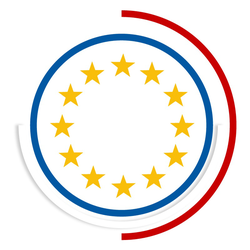
🌐suivre Marie-Anne Frison-Roche sur LinkedIn
🌐s'abonner à la Newsletter MAFR Regulation, Compliance, Law
____
► Référence complète : M.-A. Frison-Roche, audition par les rapporteures de la Commission des affaires européennes de l'Assemblée Nationale, Sophia Chikirou et Mireille Clapot dans le cadre de l'élaboration du Rapport sur devoir de vigilance des entreprises, 7 juin 2023.
____
Ce résumé a été publié après la publication du rapport parlementaire, pour ne pas gêner l'élaboration de celui-ci.
► Résumé de l'audition : À la demande des députées, il n'y a pas eu de présentation ex cathedra mais plutôt une discussion à partir de questions posées par celles-ci.
La première demande faite par Sophia Chikirou a été de formuler une définition de ce qu'est la "Régulation", puisque j'ai été présentée au début de l'audition comme ayant eu un rôle déterminant dans l'élaboration du Droit de la Régulation.
J'ai donc expliqué à la fois la façon dont les régulations peuvent être d'origines techniques ou politiques (souvent un mixte des deux), la place corrélative de l'Etat, l'évolution de cela depuis 20 ans, la constance du Droit de la Régulation au-delà de la diversité des secteurs et des sensibilités politiques des Gouvernements successifs, et l'importance du projet Européen.
J'ai montré que le Droit de la Régulation est par nature Ex Ante, porte sur l'avenir qu'il construit, demeure pour maintenir un équilibre par nature instable, l'Autorité de régulation n'étant que l'indice du Droit de la Régulation et non pas sa source.
Puis j'ai montré que la Compliance, dont la Vigilance est la pointe avancée, est le prolongement du Droit de la Régulation, le Droit de la Compliance ayant la même logique Ex Ante, trouvant sa normativité dans les buts poursuivis. Mais elle déploie le Droit de la Régulation et en démultiplie l'ambition puisqu'elle charge les entreprises de concrétiser ses buts, qu'elles le veuillent (RSE) ou qu'elles ne le veuillent pas (par exemple Sapin 2) avec une portée naturellement extraterritoriale. En cela le Droit de la Compliance est tout à fait ancré, ancré dans le Droit de la Régulation, et constitue une sorte de Révolution, dont la loi de 2017, dite "loi Vigilance", est la plus perceptible manifestation.
C'est ainsi opérée le passage du Droit de la Régulation au Droit de la Compliance, lequel a transformé les Autorités de Régulation, qui construisent, surveillent et maintiennent en équilibre les structures des secteurs en Autorités de Supervision, car la Supervision porte techniquement sur les opérateurs (ce que font les contrôles mis en place par la Vigilance) et non sur les structures, lesquelles sont prises en charge par les opérateurs (par exemple dans les chaines de valeur).
Cela explique que techniquement le Droit de la Vigilance emprunte au Droit de la Régulation et de la Supervision bancaire, car le secteur bancaire gère les risques systèmiques par la solidité et la puissance des acteurs bancaires et les outils sont les mêmes.
On se rend compte aujourd'hui de cette logique systémique de la Vigilance mais cela était déjà visible dès 2016📎
La deuxième demande faite par Sophia Chikirou a porté sur le sens du projet de directive, notamment ses enjeux et son effectivité au regard de ces explications, apparaissant comme nouvelles et éclairantes.
J'ai montré que ce texte est effectivement important et doit être compris comme l'expression politique d'une Europe qui a une sorte de "plan". Ainsi la CS3D doit se comprendre comme le texte gémellaire de la CSRD. De la même façon la loi de 2017 doit se comprendre au regard de ce plan européen. Lequel doit embrasser le DMA et le DSA. Tout cela est du Droit de la Compliance, dont la Vigilance est, et dès la loi de 2017, la "pointe avancée".
Tout le sens, et c'est le même dans tous les textes, est dans les buts. Ce sont des buts systémiques, qui portent sur le futur : éviter dans le futur une catastrophique, faire en sorte par une action présente qu'elle n'arrive pas (but "négatif"), ou (si l'on est encore plus ambitieux) faire en sorte que quelque chose arrive (but "positif") : équilibre climatique, respect d'autrui, égalité effective, probité, dignité, comme principes de fonctionnement des systèmes.
Pour cela, et pragmatiquement puisqu'il s'agit d'obtenir de l'effectivité, l'on repère les organisations qui peuvent réaliser cela : les entreprises. Plus elles sont puissantes et plus cela est possible. La puissance des entreprises n'est pas seulement bienvenue : elle est nécessaire. Le Droit de la Compliance constitue donc, et les textes qui l'expriment, une alliance entre l'Etat et les entreprises, et non pas une défaite de l'Etat (puisqu'il est plus ambitieux que jamais), la puissance des entreprises étant recherchée et devant s'exprimer.
Plus précisément, il s'agit (trilogie essentielle en Droit de la Compliance) d'obtenir l'effectivité, l'efficacité et l'efficience des textes. J'ai expliqué la définition de ces trois notions et leur articulation en pratique, notamment sur le terrain probatoire.
La troisième demande faite par Mireille Clapot a porté sur la présentation faite par moi de la logique préventive du système de Compliance, de Vigilance et notamment dans la loi de 2017, mais elle observe que le centre du dispositif est bien la réparation du dommage et non la prévention.
Effectivement, j'ai donc développé cette question essentielle de l'Ex Ante et de l'Ex Post, pour montrer que les débats avaient lieu à juste titre car le fonctionnement du dispositif n'étaient pas encore fixés par la jurisprudence. Mais si le Droit de la Régulation est bien de l'Ex Ante, le Droit de la Compliance, puisqu'il est entré dans l'entreprise même et dans des supervision, est davantage dans un continuum entre l'avant et l'après : ainsi une notion-clé est la "durabilité" (dans le titre même de la directive) et sous la "responsabilité" ce que l'on demande à l'entreprise c'est avant tout de rendre des comptes de l'usage qu'elle a fait de sa puissance (accountability), mais de sauver le monde (puisqu'à l'impossible nul n'est tenu). Si le dommage est survenu, sa responsabilité est acquise, mais l'enjeu central est de prévenir la survenance d'un dommage systémique, autant que faire se peut, voire d'améliorer les systèmes.
La quatrième demande, faite par Sophia Chikirou a porté sur la mise en place par chaque Etat-membre d'une autorité de régulation.
J'ai souligné la différence entre une Autorité de Régulation et, ce dont il s'agit ici, d'une Autorité de Supervision, la mission dont il s'agit ici étant de superviser les entreprises en charge du devoir de vigilance.
Dans son état actuel le texte ne précise pas la forme juridique institutionnelle que devrait prendre l'organe en charge de cette supervision. La difficulté technique vient du fait qu'il ne s'agit pas d'un secteur et qu'il est difficile de construire un "régulateur sans secteur" ou un superviseur ayant grand pouvoir sur ce qui n'est pas un secteur, sauf à faire autant d'Autorités qu'il y a d'industries concernées, ce qui produirait une myriade d'institutions... C''est sans doute techniquement le sujet le plus difficile dans la transposition, l'exemple allemande pouvant aider le Législateur français.
La cinquième demande faite par les deux députées porte sur la façon dont les entreprises peuvent assumer de telles obligations engendrées par ces textes, certains affirmant que cela est impossible.
J'ai expliqué que pour ma part il faut raison garder et que ce sont les juges qui sont gardiens de cela. Les entreprises ne peuvent pas sauver le monde, mais ce n'est pas ce que les textes leur demande et ce serait méconnaitre l'esprit des textes que d'affirmer cela.
Les entreprises ne sont assujetties au devoir de vigilance qu'en raison de leur aptitude à agir (détecter, prévenir, éduquer, ajuster les comportements, etc.), c'est-à-dire parce qu'elles "sont en position", non pas parce qu'elles seraient déjà "coupables". C'est un contresens que de dire cela.
C'est une chance pour l'Etat d'avoir sous sa main des entités qui ont la puissance de porter ses ambitions et c'est aussi pour cela qu'il faut absolument que le Droit de la Compliance, dont la Vigilance fait partie, soit de portée extraterritoriale, pour qu'il n'y ait pas d'effet d'aubaine.
L'entreprise fait ensuite ce qu'elle peut. Elle doit donner à voir ce qu'elle fait, dire ce qu'elle fera, le dire aux personnes concernées et au juge qui sera éventuellement saisi, l'exprimer au regard des buts monumentaux (changer le futur...) négatifs et positifs qui donne sens à tout le système : tout cela mais pas plus que cela.
La sixième demande faite par Mireille Clapot a porté sur l'impact négatif que la loi de 2017, puis potentiellement la Directive, peuvent avoir sur des contrats, notamment internationaux, conclus par des entreprises français.
J'ai tout à fait souligné comme elle le caractère essentiel de cette analyse économique du Droit. C'est pour cela d'une part que dans les contrats les entreprises soient incitées à insérer des "clauses de compliance", dont les "clauses de vigilance" font partie (notion que j'ai proposée), que les juges interprètent et appliquent celles-ci en articulant Droit des contrats et Droit de la compliance, et que leur portée à la fois sur les tiers et sur d'autres territoires soient reconnues.
En effet le Droit de la Compliance, dont la Vigilance est la pointe avancée, est une façon d'humaniser l'économie et non de remettre en cause le principe de liberté qui doit continuer à animer celle-ci. Le contrat est un outil essentiel de détecter et de prévenir et les entreprises doivent pouvoir l'utiliser librement. J'ai développé sur ce point le rôle que le juge, y compris le juge de droit commun, va jouer.
____
► Voir dans mes travaux ceux qui peuvent présenter un intérêt au regard de cette discussion menée par les deux Rapporteures⤵️
🕴️M.-A. Frison-Roche, 🎤Le rôle du Juge dans le déploiement du Droit de la Régulation en Droit de la Compliance, et le document de travail sous-jacent : juin 2023.
🕴️M.-A. Frison-Roche, 🚧La vigilance, pièce d'un puzzle européen, mars 2023.
🕴️M.-A. Frison-Roche, 🚧Penser et manier la Vigilance par ses Buts Monumentaux de Compliance, mars 2023.
🕴️M.-A. Frison-Roche, 📝Contrat de compliance, clauses de compliance, mars 2022.
🕴️M.-A. Frison-Roche, 🚧L'invention de la vigilance : un terme nouveau pour une Responsabilité en Ex Ante, février 2021.
🕴️M.-A. Frison-Roche, 📝Le Droit de la compliance, 2016.
____
►lire le rapport parlementaire
________
🕴️M.-A. Frison-Roche, 🚧Compliance Law, 2016.
July 5, 2023
Interviews

♾️follow Marie-Anne Frison-Roche on LinkedIn
♾️subscribe to the Newsletter MAFR Regulation, Compliance, Law
____
► Full Reference: M.-A. Frison-Roche et A. Seban, "Compliance : les cours suprêmes s’emparent de la question de ses enjeux juridictionnels" ("Compliance : the Supreme Courts take up the issue of its jurisdictional implications"), interview with Olivia Dufour, Actu-Juridique, 5 July 2023.
____
💬read the interview (in French)
____
► Presentation of the interview by the journal (in French): "Le 2 juin dernier s’est tenu au Conseil d’État un colloque fondateur sur le rôle du juge dans la compliance. Le professeur Marie-Anne Frison-Roche et le conseiller d’État Alain Seban, qui ont tout deux contribué aux débats, ont accepté de commenter les principaux enseignements des travaux de cette journée."
____
► Questions asked (in French):
- Le colloque « De la régulation à la compliance, quel rôle pour les juges » qui s’est tenu au Conseil d’État le 2 juin dernier a rassemblé juges civils et administratifs. En quoi le juge administratif est-il concerné par la compliance qui semble plutôt une affaire d’entreprises et donc de justice civile et commerciale ?
- Vincent Vigneau, président de la chambre commerciale de la Cour de cassation rappelle que la compliance a plutôt vocation à éviter le juge en se situant ex ante, pourtant on découvre que le juge lui-même accepte de plus en plus de se prononcer en ex ante… qu’en est-il ?
- Quel peut donc être le rôle du juge dans la compliance ? Peut-il contribuer à faire émerger un droit de la compliance et à l’harmoniser ?
- François Ancel semble considérer que le rôle juge va devoir adapter son office à la compliance, il évoque trois concepts : téléologique, soutenabilité et efficacité…
- Le juge dispose-t-il en l’état de tous les outils nécessaires ? Si tel n’est pas le cas, que faut-il créer ?
- En quoi le dialogue des juges, civil/administratif, national/européen, national/international, est-il important ?
- Que veut dire F. Ancel quand il déclare que le juge doit évoluer du constat à la trajectoire ?
- Existe-t-il des domaines où la compliance entre en conflit avec des principes processuels, par exemple le principe de légalité des peines ?
- En quoi la notion de « buts monumentaux », que vous avez créée en 2016, a-t-elle trouvé sa place dans le droit ?
________
June 19, 2023
Conferences
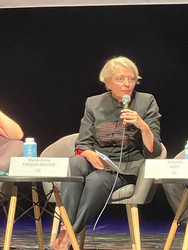
♾️ follow Marie-Anne Frison-Roche sur LinkedIn
♾️subscribe to the Newsletter MAFR Regulation, Compliance, Law
____
► Full Reference: M.-A. Frison-Roche, participation in the panel "Vigilance (due diligence)", in International Law Association (ILA), 150th Anniversary Symposium of the ILA/ADI, Paris, 19 June 2023.
____
🧮See the full programme of this event
________
Updated: June 16, 2023 (Initial publication: Nov. 24, 2022)
Conferences

♾️ suivre Marie-Anne Frison-Roche sur LinkedIn
♾️ s'abonner à la Newsletter MAFR Regulation, Compliance, Law
____
 ► Référence complète : Frison-Roche, M.A., Les programmes de compliance, in Université de Lille, Les risques concurrentiels des entreprises à l’aune de la transition écologique et numérique : regards croisés sur les outils de prévention, Lille, 16 juin 2023. ____
► Référence complète : Frison-Roche, M.A., Les programmes de compliance, in Université de Lille, Les risques concurrentiels des entreprises à l’aune de la transition écologique et numérique : regards croisés sur les outils de prévention, Lille, 16 juin 2023. ____
► Présentation générale de la conférence : sss
____
► pour aller plus loin ⤵️
June 13, 2023
Conferences
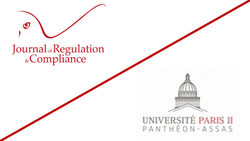
♾️ suivre Marie-Anne Frison-Roche sur LinkedIn
♾️s'abonner à la Newsletter MAFR Regulation, Compliance, Law
____
► Référence complète : M.-A. Frison-Roche, "L’obligation de compliance, entre volonté et consentement : obligation sur obligation vaut", in B. Deffains, M.-A. Frison-Roche et J.-B. Racine (dir.), Journal of Regulation & Compliance (JoRC) et Université Paris Panthéon-Assas, Compliance : Obligation, devoir, pouvoir, culture, Université Panthéon-Assas, Salle des Conseils, 13 juin 2023.
____
🎤consulter la présentation de l'autre conférence faite lors de la seconde journée de ce colloque : "Compliance et Droit processuel"
____
🧮Consulter le programme de cette manifestation
____
► Présentation de la conférence : Le Droit des contrats noue le "consentement" et la "volonté", puisque le consentement est ce qui manifeste la volonté d'une personne, en marque la liberté et l'engagement, en constitue la trace et la preuve. En 1995, j'ai montré que le Droit économique avait distingué le consentement et la volonté, pour rendre les consentements autonomes et en faire des marchés, notamment dans le Droit de la concurrence et le Droit financier📎
Puis en rendant hommage à Pierre Godé qui avait fait sa thèse sur la volonté📎
Mais la difficulté à comprendre le système général du Droit de la Compliance vient de la confusion souvent faite entre celui-ci et ce qui n'est qu'un de ses outils : la conformité. Or, la conformité est l'obligation pour un sujet de droit, certaines entreprises de donner à voir en Ex Ante qu'elles obéissent activement à la réglementation qui leur est applicable. J'ai montré en 2016📎
Les entreprise qui sont sujets du Droit de la Compliance ne sont alors pas toutes les entreprises, ni celles qui seraient "coupables" par avance, mais celles qui "sont en position" d'atteindre les buts : les "entreprises cruciales", notion que j'ai proposée en 2006📎
Il demeure que les entreprises, qui entrent dans le commerce juridique par leur personnalité juridique, peuvent elles-aussi exprimer leur volonté et non pas seulement consentir. Elles le font non seulement dans la mise en œuvre, ce que la Volonté du Législateur leur demande, mais encore en édictant des Buts, là où se loge la normativité du Droit de la Compliance.
C'est là où l'on doit affirmer dans un nouvel adage : Obligation sur Obligation vaut.
En effet, si l'entreprise exerce sa puissance juridique non seulement sa capacité à obéir (consentement), ce qui est une puissance faible, mais encore en exerçant leur puissance pour l'effectivité, l'efficacité et l'efficience des Buts Monumentaux du Droit de la Compliance, les systèmes et les êtres humains qui y sont impliquées en sont les bénéficiaires.
C'est pourquoi dans une conception générale du "pouvoir" que j'ai dessinée pour rendre hommage à Emmanuel Gaillard qui avait consacré sa thèse à cette notion📎
Le sujet premier devient alors en théorie et en pratique l'articulation entre la Volonté du Législateur (la "réglementation" applicable) et la Volonté des entreprises cruciales. Ce point sera particulièrement développé lors de la conférence.
La dimension probatoire de la question sera plutôt développée le lendemain dans la conférence qui, dans le cadre de ce cycle portant sur L'Obligation de Compliance, portera sur Compliance et Droit processuel.
_____________________________
La conférence est construite en trois temps :
III. OBLIGATION SUR OBLIGATION VAUT
________
M.-A. Frison-Roche, Remarques sur la distinction....
Mettre le titre et la fiche qui donne les références de la thèse
M.-A. Frison-Roche, Oui au principe de la volonté, Non aux consentements purs, 2018.
M.-A. Frison-Roche, Le Droit de la Compliance, 2016.
M.-A. Frison-Roche, Proposition pour une notion : "l'entreprise cruciale", 2006.
M.-A. Frison-Roche (dir.), Régulation, Supervision, Compliance, 2017.
M.-A. Frison-Roche, Concevoir le pouvoir, 2021.

June 13, 2023
Organization of scientific events
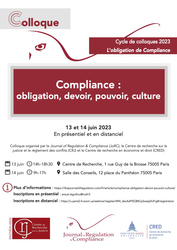
► Référence complète : B. Deffains, M.-A. Frison-Roche et J.-B. Racine (dir.), Journal of Regulation & Compliance (JoRC), Centre de recherche sur la justice et le règlement des conflits (CRJ) et Centre de recherche en économie (CRED) de l'Université Paris Panthéon-Assas (Paris II), Compliance : Obligation, devoir, pouvoir, culture, Université Paris Panthéon-Assas, 13 et 14 juin 2023.
____
🏗️Ce colloque s'inscrit dans le cycle de colloques organisé par le Journal of Regulation & Compliance (JoRC) et ses Universités partenaires, portant en 2023 sur le thème général de L'Obligation de Compliance.
____
📚Les travaux s'inséreront ensuite dans les ouvrages :
📕L'obligation de Compliance, à paraître dans la collection 📚Régulations & Compliance, coéditée par le Journal of Regulation & Compliance (JoRC) et Dalloz, publié en langue française.
📘Compliance Obligation, à paraître dans la collection 📚Compliance & Regulation, coéditée par le Journal of Regulation & Compliance (JoRC) et Bruylant, publié en langue anglaise.
____
► Présentation générale du colloque : "L'obligation" est au cœur de bien des disciplines. Les techniques de compliance prennent très souvent la forme d'obligations. Mais pour ne mentionner que les premières interrogations qui viennent à l'esprit et dans les cas, notamment ceux qui sont posés aux juridictions, c'est paradoxalement assez peu le "Droit des obligations" qui a été utilisé, le Droit de la Compliance étant d'une part assez souvent assimilé à la "réglementation", et son unilatéralité, comme le fût le Droit de la Régulation, branche du Droit qu'il prolonge, d'autre part on lui a souvent associé l'éthique, la morale, une culture partagée, tout ce qui semble mettre en distance de l'obligation. Les notions de "devoir" et d'"engagement", prennent de plus en plus place dans le Droit de la Compliance, avec une portée encore incertaine. C'est pourquoi, au-delà de la multiplicité des "obligations de compliance", l'on peut se demander s'il existe une "obligation de compliance", quelle serait sa définition et son rapport avec tout ce qui, dans le Droit de la Compliance, ne serait pas une obligation.
____
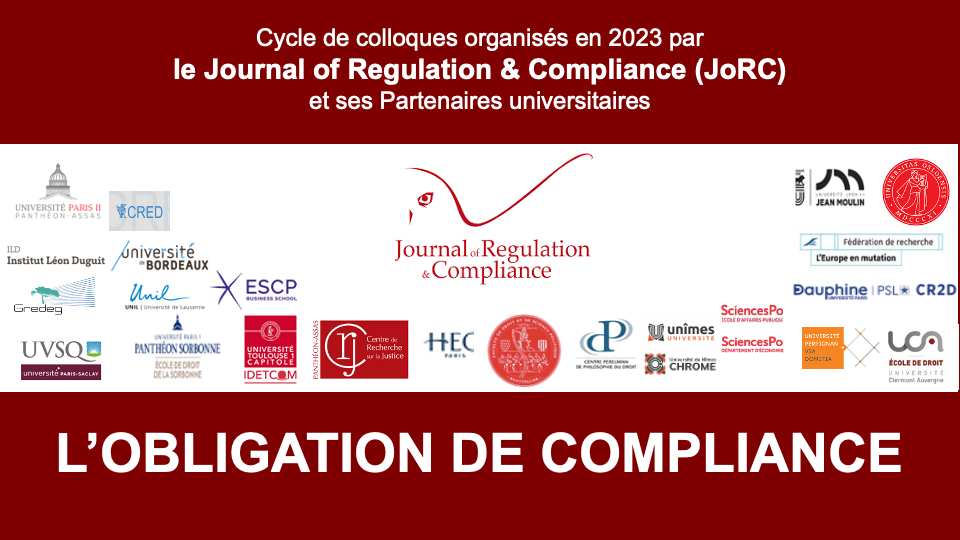
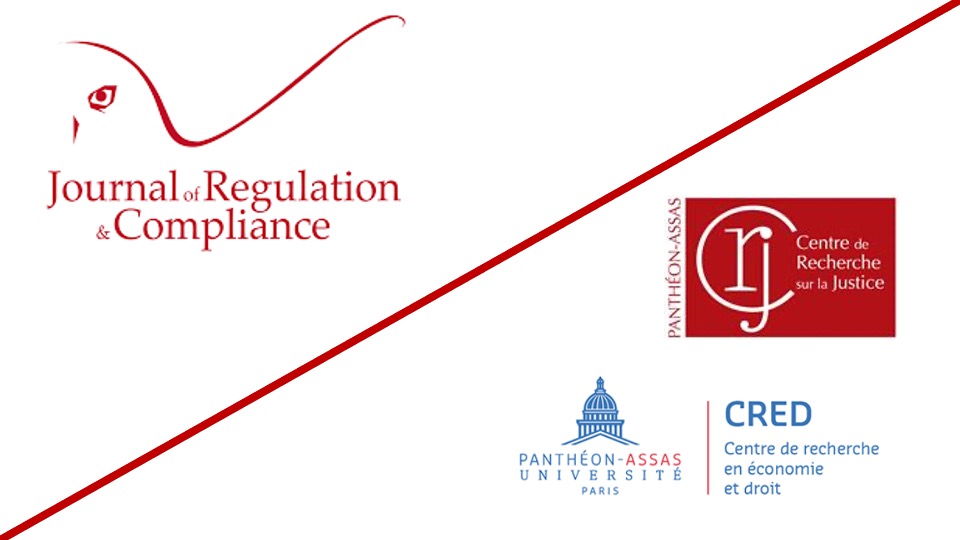
____
► Interviennent :
🎤Jean-Sébastien Borghetti, professeur à l'Université Panthéon-Assas (Paris II)
🎤Louis d'Avout, professeur à l'Université Paris Panthéon-Assas (Paris II)
🎤Bruno Deffains, professeur d'économie du Droit, Université Panthéon-Assas (Paris II)
🎤Marie-Anne Frison-Roche, professeur de Droit de la Régulation et de la Compliance, directrice du Journal of Regulation & Compliance (JoRC)
🎤Daniel Gutmann, professeur à l'Ecole de Droit de l'Université Panthéon-Sorbonne (Paris I)
🎤Anne-Valérie Le Fur, professeure à l'Université Paris-Saclay
🎤Gilles Lhuilier, professeur à l'ENS de Rennes, directeur du département Droit, Economie, Gestion
🎤Etienne Maclouf, professeur en sciences de gestion à l'Université Panthéon-Assas (Paris II)
🎤Jean-Baptiste Racine, professeur de Droit, Université Panthéon-Assas (Paris II)
🎤René Sève, directeur de l'Association française de philosophie du droit (AFPD) et des Archives de Philosophie du Droit (APD)
🎤Marta Torre-Schaub, directrice de recherches au CNRS, Institut des sciences juridique et philosophique de la Sorbonne, Université Panthéon-Sorbonne (Paris I)
____
Lire une présentation détaillée de la manifestation ci-dessous⤵️